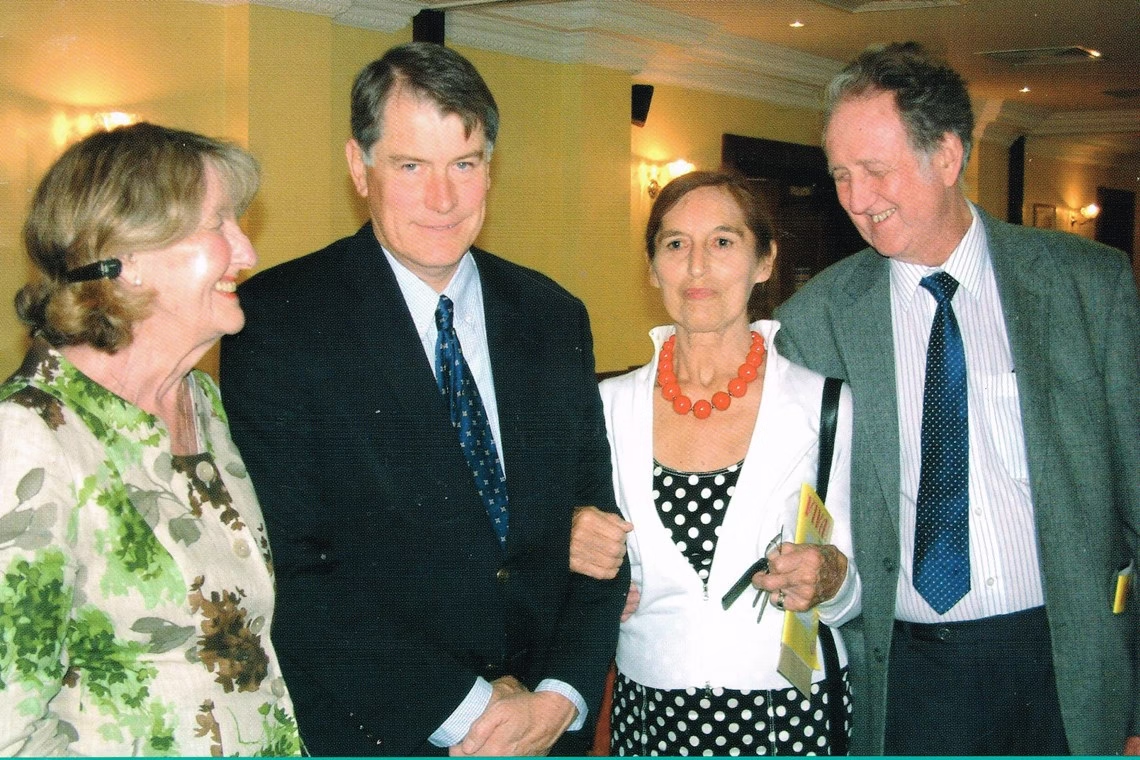Sheila Oliver 1943 - 2020
An appreciation of her life by Prof. Chris Pugh
It is with regret and sorrow that we record the death on 12th August of Sheila Oliver (nee Russell), although both emotions are eased by the knowledge that Sheila achieved her final goal which was to die peacefully in her own home in Horton cum Studley. This ‘success’ was the last of many in her astonishing life, over 52 years of which were enabled by renal replacement therapy (close to the world record).
Sheila was born in wartime England in January 1943, nonetheless enjoying a happy rural upbringing until she began to develop health problems in her late teens. In 1963 she developed nephrotic syndrome and was told to expect progression to end-stage renal disease, for which at that stage there was no effective long-term treatment. She appears to have taken what was effectively a death sentence with remarkable poise and equanimity.
Her kidneys did indeed fail in the Spring of 1968. An attempt was made to treat her by peritoneal dialysis through a rigid tube (the floppy Tenckhoff catheter available now having not yet been invented); this was a disaster, with the rigid tube perforating her bowel making on-going peritoneal dialysis impossible. Thankfully ‘experimental’ hospital haemodialysis had recently been approved in Oxford and she became only the fourth patient to be treated this way here. The capacity for maintenance hospital dialysis treatment then was non-existent and all the patients had to learn to provide their own treatment at home. Sheila and her family set about this task and Sheila first dialysed at home on 12th August 1968 (the beginning of exactly 52 years of home-based kidney treatment). Whilst many would have been devastated by the unfairness of developing kidney failure, Sheila (at least latterly) felt extremely lucky that her kidneys had lasted long enough for her to benefit from this lifeline.
A problem with being an ‘early adopter’ of anything is that you inevitably become amongst the first to encounter its problems. Sheila was no exception in this regard, her medical record reading like a textbook list of complications that arise from kidney failure and/or its treatment. She showed immense resourcefulness, self-discipline and fortitude in overcoming, or at least ameliorating, these difficulties. Her unique characteristics were obviously appreciated by the founder of the Oxford Kidney Unit, Dr. Des Oliver, and they married in 1972.
Sheila and Des were a phenomenal team, using what might have been regarded by some as ‘conflicts of interest’ to the benefit of the growing community of Oxford home haemodialysis patients. One example of this being their contributions to the foundation and success of the Shunt Club, which was subsequently re-named the Six Counties Kidney Patients’ Association. The patients, their families and the nurses, carers and technicians that supported them were in some ways an extended family for them. Other ‘adoptees’ included a selection of junior doctors from various parts of the globe who received nephrology training in Oxford and got to know and admire Sheila – they will know who they are and will all be feeling a sense of loss.
Sheila was one of the first dialysis patients to benefit from erythropoietin, initially back in 1986 through being a subject in the ground-breaking research study run by Chris Winearls and Mary Cotes. However, with dialysis-complications accumulating and the success of Peter Morris’ transplant programme rising Sheila was added to the kidney transplant waiting list. She received a cadaveric renal transplant on 14th March 1989. I remember visiting her with Fernando Fervenza shortly after the surgery was complete. Thankfully the transplant worked well from the beginning and at last she was freed from the constraints imposed by thrice weekly home haemodialysis. Tragically, within 4 years Des himself was ill with the oesophageal cancer that ultimately killed him in 1997. She felt this loss heavily; always a private person she became increasingly reclusive.
Over time, and with immense support from her nieces and Oliver, who became her companion, carer and confidante, she began to regain a sense of joy in life and the countryside, although there were still some very dark spells. A highlight was a trip to India, carefully planned and choreographed through Farookh Wadia, who had previously been one of the many doctors to look after her and who now runs a Kidney Unit in Puna. This trip gave her new insights into Indian culture and spirituality, some aspects of which were reflected in the decorations at a celebratory party with an East-West theme she arranged in the Ashmolean Museum to mark her 60th birthday, an occasion she never expected to see.
Sheila continued to show an interest in, and care for her Renal Unit ‘family’ and those dear to them. Her delight at Peter Ratcliffe’s award, last year, of the Nobel Prize in Physiology or Medicine was coupled with deep concern that he was not working too hard and that his family were well. Visits to Sheila’s home in Priory Close were always on her terms but Sheila, and whichever dogs were present, always made one feel welcome. Conversation sometimes had the flavour of a very subtle interrogation, Sheila always extracting slightly more information than you had intended to give, whilst effortlessly managing to parry most attempts to establish her inner thoughts.
In recent times medical problems returned. Sheila remained shrewd in weighing up the risks and potential benefits of various care decisions and putting in place appropriate advance care plans. Her care was co-ordinated in partnership with Paul Harden, her consultant at the Kidney Unit and Julie Tranter, her GP at Islip Surgery. In February after much debate she went ahead with a high-tech, cure or kill (but with a significant risk of causing a disabling stroke), medical procedure in the hope that it would give her one last Spring, and perhaps a little Summer too – she got both, and is perhaps not sorry to miss the thunderstorm and torrential downpour occurring as I write this.
In a ‘phone call during ‘lockdown’ she explained the way in which she had, in typical manner, meticulously planned her own shielding with the support of a trusted few. She acknowledged with some delight that shielding in some way legitimised her isolation, whilst at the same time expressing concern and sympathy for those who were finding it difficult, or missing much needed summer holidays.
At her express wish there is to be no funeral service, but I hope nonetheless that those who knew Sheila will take a moment or two to reflect on the remarkable person behind this medical catalogue and history lesson. We are all richer for having known her and all will admire, and have learnt from, at least some of her unique characteristics. Those who did not know Sheila can perhaps reflect on this brief tribute and appreciate some of what they have missed.


If you wish to mark her life and death, please make a donation to one of the following:
SCKPA: click here for details on ways to donate
Kidney Research UK: click here to go to their donation page
Oxford Kidney Unit Trust Fund:
Payment by bank transfer: Oxford Kidney Unit Trust Fund, Lloyds Bank, Account No: 18787868, Sort Code: 30-63-97
- Cheques: made payable to Oxford Kidney Unit Trust Fund Ltd (MUST be in full)
and sent to: Mrs Charlotte Devlin, 3 The Broadway, Charlton-on-Otmoor, OX5 2UBDonations of more than £20: a Gift Aid certificate will be provided on request.
Donations of £20 or less: just need a note from the donor that Gift Aid applies.
The covering note should state that the donation is for the YAC Fund but DO NOT write this on the cheque.
